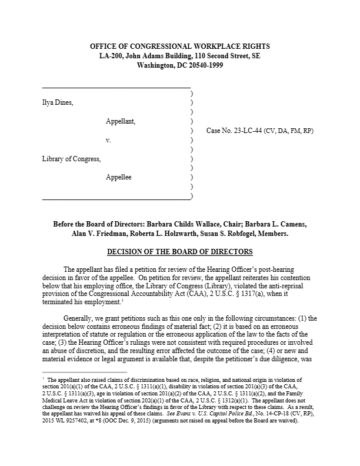DECISION OF THE BOARD OF DIRECTORS
The appellant has filed a petition for review of the Hearing Officer’s post-hearing decision in favor of the appellee. On petition for review, the appellant reiterates his contention below that his employing office, the Library of Congress (Library), violated the anti-reprisal provision of the Congressional Accountability Act (CAA), 2 U.S.C. § 1317(a), when it terminated his employment.1
Generally, we grant petitions such as this one only in the following circumstances: (1) the decision below contains erroneous findings of material fact; (2) it is based on an erroneous interpretation of statute or regulation or the erroneous application of the law to the facts of the case; (3) the Hearing Officer’s rulings were not consistent with required procedures or involved an abuse of discretion, and the resulting error affected the outcome of the case; (4) or new and material evidence or legal argument is available that, despite the petitioner’s due diligence, was not available when the record closed. 2 U.S.C. § 1406(c); Procedural Rule § 8.01. After fully considering the filings in this appeal, we conclude that the appellant has not established any basis for granting the petition for review. Therefore, we DENY the petition for review and AFFIRM the Hearing Officer’s decision in its entirety.2
ORDER
For the foregoing reasons, the Board affirms the Hearing Officer’s decision in favor of the appellee on all claims.
It is so ORDERED.
Issued, Washington, D.C., March 24, 2025
1 The appellant also raised claims of discrimination based on race, religion, and national origin in violation of section 201(a)(1) of the CAA, 2 U.S.C. § 1311(a)(1), disability in violation of section 201(a)(3) of the CAA, 2 U.S.C. § 1311(a)(3), age in violation of section 201(a)(2) of the CAA, 2 U.S.C. § 1311(a)(2), and the Family Medical Leave Act in violation of section 202(a)(1) of the CAA, 2 U.S.C. § 1312(a)(1). The appellant does not challenge on review the Hearing Officer’s findings in favor of the Library with respect to these claims. As a result, the appellant has waived his appeal of these claims. See Evans v. U.S. Capitol Police Bd., No. 14-CP-18 (CV, RP), 2015 WL 9257402, at *8 (OOC Dec. 9, 2015) (arguments not raised on appeal before the Board are waived).
2 In finding the appellant failed to establish a prima facie case of reprisal, the Hearing Officer stated that “temporal proximity, standing alone, does not show that there was a causal connection between the [appellant’s] protected activity and his termination.” To the extent this statement could be read to mean that temporal proximity alone can never be sufficient to establish the causation element of a prima facie case, this was error. Temporal proximity, standing alone, can satisfy the causation element. See Evans, 2018 WL 4382909, at *5 (temporal proximity sufficient to show causation); see also Woodruff v. Peters, 482 F.3d 521, 530 (D.C. Cir. 2007) (temporal proximity of less than 1 month supported causation and established a prima facie claim, but the employee’s claim nonetheless failed because she failed to present “positive evidence beyond mere proximity” to defeat employer’s proffered explanations). Because the Hearing Officer ultimately rejected the appellant’s reprisal claim on the grounds that the Library had legitimate, non-retaliatory reasons for terminating appellant that the appellant failed to demonstrate by a preponderance of the evidence were a pretext for reprisal—and not because the appellant had failed to establish a prima facie case—the Hearing Officer’s error is harmless and does not provide a basis for granting the appellant’s petition for review. See Evans, 2018 WL 4382909, at *4 (where hearing has been held, question of whether the employee has established a prima facie case drops from the case and the inquiry shifts to whether the employee has demonstrated by a preponderance of the evidence that the employing office’s proffered reason for its actions was a pretext for reprisal); see also Texas Dep’t of Cmty. Affairs v. Burdine, 450 U.S. 248, 255-56 (1981).
